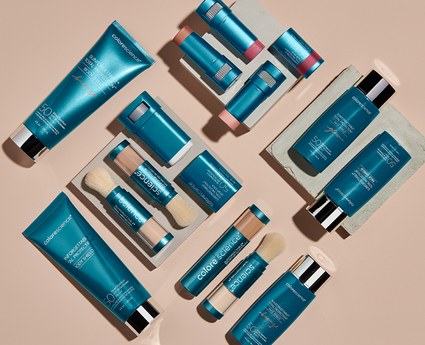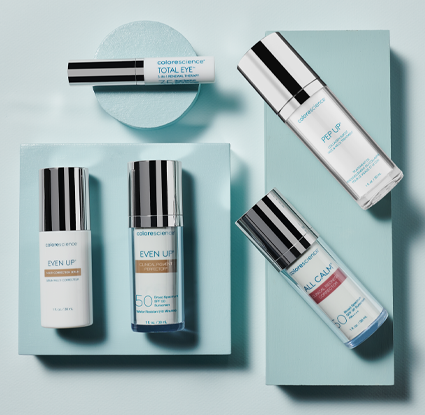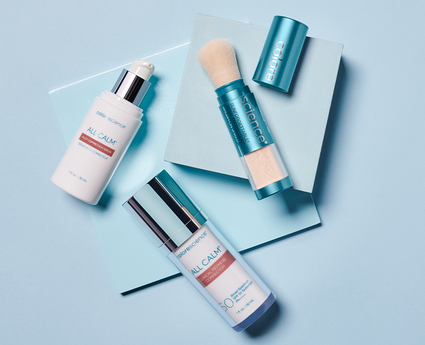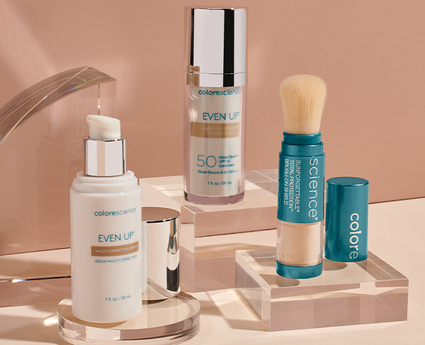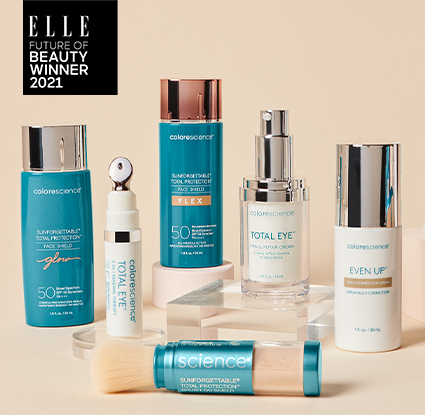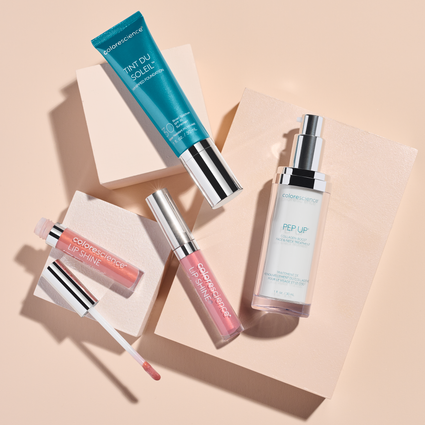Does Sunscreen Help Acne?
There are countless products you can use in hopes of achieving that porcelain clear skin you’ve always wanted. There are face washes, serums, moisturizers, exfoliators, toners… and that’s just naming a few of the many skin care products out there. But one of the most important skin care products you can use will always be sunscreen.
Sunscreen helps protect your skin from harmful UV rays that can cause signs of aging on your skin, like fine lines and wrinkles. Sunscreen also protects against sun damage and skin cancer. Sunscreen should be applied on a daily basis as the last step of your skin care routine. We know that sunscreen protects your skin from the harmful UV rays from the sun, but does sunscreen help acne?
You might think that sunscreen will clog your pores, but it actually does quite the opposite. When you wear sunscreen on your face, you’re less likely to get sunburn. Sunburn and tans can dry out acne on your skin and lead to an increase in oil production. This increase in oil can cause even more breakouts.
While it might be tempting to skip applying sunscreen, it’s important to make it a priority of your daily skin care routine. Trust us, you’ll thank yourself later when your skin is youthful and glowy for years to come.
In this blog post, we’ll be discussing important questions about sunscreen, like “does sunscreen help with acne scars?” and “what are the best types of sunscreens to use for acne prone skin?”. To learn more about how wearing sunscreen can help you achieve clear, healthy skin, continue reading. Otherwise, you can use the links below to skip to a section of your choice.
- Does sunscreen cause acne?
- How sunscreen improves acne?
- What is the best type of sunscreen for acne prone skin?
- Are any types of sunscreen more likely to cause breakouts?
- How to Banish Acne with the Right Sun Protection Products
Does sunscreen cause acne?
For the most part, sunscreen does not cause acne. However, certain types of sunscreens can cause or worsen acne if they contain ingredients that irritate the skin and clog your pores. But this is why it’s crucial to use non-comedogenic sunscreen. Non-comedogenic sunscreen won’t clog your pores, meaning it shouldn’t contribute to breakouts.
There are two types of sunscreens you can choose: chemical sunscreen and physical sunscreen. Chemical sunscreen penetrates into the skin and then absorbs UV rays and converts them into heat, which the body will then release. Physical sunscreen, on the other hand, sits on top of the skin and reflects the sun’s rays. It is believed that chemical sunscreen is potentially worse for your skin, as it can irritate the skin which may contribute to breakouts.
Non-comedogenic formulas make mineral sunscreen ideal for acne-prone skin, providing protection without clogging pores.

When deciding which type of sunscreen is best for you, you should take into consideration the type of skin you have. But even if you are acne-prone, that’s not an excuse to skip sunscreen. Sunscreen is important for all skin types, whether you tend to break out or not.

How sunscreen improves acne
So, does sunscreen help acne?
Yes! In addition to protecting your skin from UV rays—including reducing exposure to free radicals which correlate to worse acne—and signs of aging, sunscreen can also help your skin. In fact, sunscreen can actually help treat uneven skin and reduce skin redness.
Think of it this way: when you get a sunburn, your skin is going to become red and inflamed. So any existing acne you may have is only going to look worse. Inflammation can worsen acne and can even cause scarring, which can be even harder to fix than acne. Plus, sun exposure darkens skin and can make scarring and other dark spots more noticeable.

Being in the sun without any sun protectant can also dry out your skin and make your skin more oily, thus leading to acne. You may think that the sun is good for your skin. But in reality, a nice tan just makes your acne temporarily less noticeable. But when the tan fades, your acne will still be there. Applying sunscreen on a daily basis is better for your skin in the long run.
Ingredients like zinc oxide and niacinamide, which are often found in sunscreen, also have anti-inflammatory properties which can help reduce inflammation and relieve acne. Sun damage can also cause hyperpigmentation, which can make acne scars look much worse than they are. So if you’re prone to scarring, it’s even more important to always apply sunscreen.
If you have or are prone to acne scarring, you can also try using vitamin C with your sunscreen. Vitamin C can help reduce hyperpigmentation, fine lines, and wrinkles, and sunscreen will help your scars fade more quickly.
What is the best type of sunscreen for acne prone skin?
Now that we’ve answered “does sunscreen help with acne?”, we can help you in the next step of the process: finding a good sunscreen solution.
If you’re prone to breakouts, it’s very important to use the right type of sunscreen. Sunscreen for acne-prone skin should be:
- Lightweight
- Gentle on the skin
- Fragrance-free
- Made with a non-comedogenic formula
You should look for a sunscreen with ingredients like:
- Lactic acid
- Hyaluronic acid
- Niacinamide
These will keep the skin healthy and won’t leave any of that pesky white residue that tends to happen with other types of sunscreen.
Acne-prone skin benefits from SPF 50 sunscreen for face that won't clog pores or cause breakouts.
There are countless different types of sunscreens available to purchase, including sunscreen for acne prone skin that feels lightweight on your face and doesn’t make you break out.
Try one of our mineral sunscreens like our Sunforgettable® Total Protection™ Face Shield Classic SPF 50 or Sunforgettable® Total Protection™ Brush-On Shield SPF 50.

Are any types of sunscreen more likely to cause breakouts?
So now that you know what type of sunscreen is best for acne prone skin, let’s discuss what types of sunscreen you should avoid.
Just like any skin care product, there are sunscreens you should and shouldn’t use. There are a few ingredients you should steer clear of when shopping for sunscreen if you have acne-prone or sensitive skin.
Some of these ingredients include:
- Benzophenones
- Cinnamates
- Octocrylene
- Quaternium-15
- Para-aminobenzoic acid
Avoiding these ingredients basically means you’re choosing a sunscreen that is non-comedogenic. Non-comedogenic products will not clog your pores, so they’re best for people with acne-prone skin.
If you’re prone to breakouts, you should also skip chemical sunscreens and opt for physical sunscreens instead. Since physical sunscreen provides sun protection by reflecting sun rays, rather than absorbing into the skin like mineral sunscreen does, it’s typically much better for your skin.
Tinted formulas offer coverage and protection, making the best tinted sunscreen for acne prone skin a two-in-one solution.
It’s also important to not use expired sunscreen. If your sunscreen is expired or if the product has been damaged in any way, the ingredients could have gone bad and it could be harmful for you to use on your skin.
You shouldn’t leave your sunscreen out in the sun for long periods of time, either. The sun can break down chemicals in the sunscreen, which can lead to breakouts and skin irritation. It’s a good idea to replace your sunscreen every season, especially sunscreen that you’re putting on your face.

How to Banish Acne with the Right Sun Protection Products
Everyone dreams of having perfectly clear skin, that is completely even without a single blemish in sight. But achieving that skin isn’t always so easy. You can have the most thorough and dedicated skin care routine and still find yourself face to face with a pesky pimple from time to time. But one of the best ways to treat acne is with the right sun protection products.
Choosing the right type of sunscreen for your skin can seem like a daunting task. Especially with the virtually endless options you’re faced with today. How could you ever know what the best one is for you?
The right sunscreen for you ultimately depends on the type of skin that you have.
- If you have oily skin, you should probably opt for a sunscreen that can control excess oil but still provides necessary protection from UV rays.
- If you have sensitive or acne-prone skin, you’ll want to opt for non-comedogenic physical sunscreen that’s lightweight and free of any fragrances.
But regardless of the type of sunscreen that you use, you should always use one with at least a SPF of at least 30. This will block 97% of the sun’s UVB rays.
But did you know that UV protection isn’t limited to just sunscreen? There are actually tons of different skin care and makeup products that contain SPF and can benefit your skin in other ways. For example, you can get corrective pigmentation skincare, which are skin care products that provide UV protection and help to diminish the appearance of discoloration and hyperpigmentation.
Colorescience has a myriad of different skin care and makeup products, so you can easily find something that works for your type of skin. Whether you’re looking for mineral sunscreen, primer, or foundation, we have something for every cosmetic need and skin type.
We also have products to help with different concerns, like pigmentation, redness, oily skin, dry skin, sensitive skin, and more. If you have dark spots on your skin, we have products like a dark spot corrector cream and an anti-pigmentation cream, which can help conceal dark spots and reduce signs of sun damage. If you notice hyperpigmentation and discoloration on your complexion, we also have a skin discoloration cream that is great for reducing the appearance of sunspots, melasma, rosacea, and more.
Prioritize Sun Protection without Sacrificing Your Clear Complexion
So, does sunscreen help acne? Yes, it certainly does. And Colorescience is here to help you achieve that clear skin you’ve always dreamed of having– one product at a time.
Whether you’re wearing your sunscreen bare-faced or with your makeup, we have a range of easy-to-use mineral sunscreens that you can take with you on-the-go. From our Sunforgettable® Total Protection™ Sport Protection Stick to our Sunforgettable® Total Protection™ Sheer Matte Sunscreen Brush, we have the acne-friendly sun protection you need to take on your day with confidence.

